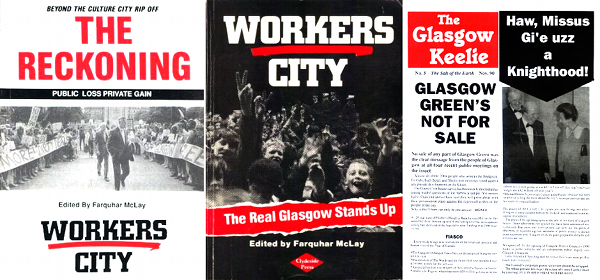This site contains an archive of texts – Workers City (1988),
The Reckoning (1990) and the The Keelie (1990-93) –
all produced by the Workers City group in the context of challenging
the logics of public-private interests before, during, and after
Glasgow City Council’s hosting of the European City of Culture in
1990. Workers City (1988) and The Reckoning (1990)
were initially published as book anthologies; The Keelie was
an irregular “scandal-mongering” newssheet that ran to over 20
editions between 1990 and 1993. These texts have been scanned, proof
read, and made available by
The Strickland Distribution, an
artist-run group supporting the development of independent research in
art-related and non-institutional practices.
Workers City group member and editor of their two anthologies,
Farquhar McLay, describes the Workers City position in the
introduction to The Reckoning like this:
“The Workers City Group is not a political party. We do not have
the financial resources available to our opponents. We do not
[...] try to force our ideas down anyone’s throat. We argue. And
when we have argued things out we try to place our point before
the public. Naturally among ourselves we disagree in regard to
many things. But one thing upon which we are all agreed is this:
the city belongs to its people and not to the political gangsters
and the big-money men whose only interest in Glasgow is what they
can milk it for”(1)
What was the European City of Culture 1990? The University Network of
the European Capitals of Culture say this:
“The European Capital of Culture is a city designated by the
European Union for a period of one year during which it is given a
chance to showcase its cultural life and cultural development. A
number of European cities have used the City of Culture year to
transform completely their cultural base and, in doing so, the way
in which they are viewed internationally”(2)
A Glasgow City Council information sheet describes Glasgow 1990 this
way:
“Glasgow City Council saw 1990 as part of a strategic investment
programme, which would ensure the long-term future of the cultural
sector and contribute greatly to economic and social regeneration.
[…] Glasgow was the first British city to successfully implement a
strategy that used the arts as a catalyst for urban regeneration.
This has now been replicated in many other parts of the world. […]
The 1990 team made 2 strategic decisions that would influence how
Glasgow would celebrate its title. They were: The cultural
programme would take place throughout the year, rather than just
for a few weeks or months as all previous cities had done. The
definition of culture would include everything that makes Glasgow
what it is: history, design, engineering education, architecture,
shipbuilding, religion and sport, as much as music, dance, visual
arts and theatre”(3)
What was The Workers City group’s position on the European City of
Culture 1990? In Farquhar McLay's Introduction to
Workers City, he writes:
“GLASGOW: European City of Culture 1990. The announcement came
from the Tory Arts minister, Edward Luce, in October 1986. It had
a sickeningly hollow ring to it. Looking at the social, cultural
and economic deprivation in working-class areas of Glasgow, and
thinking about the rigours of the new Social Fund and Poll Tax to
come, it sounded like blatant and cynical mockery
[…]
There is widespread acceptance that it has nothing whatever to do
with the working-or the workless-class poor of Glasgow but
everything to do with big business and money: to pull in
investment for inner-city developments which, in the obsessive
drive to make the centre of the city attractive to tourists, can
only work to the further disadvantage of the people in the poverty
ghettoes on the outskirts”(4)
You can read much more by the Workers City group and an extended
introduction to the texts by The Strickland Distribution on this site.
As Strickland Distribution, we had originally thought to republish
these texts, both online and as hard copies. This republishing project
became part of knowledge is never neutral, a year-long series
of projects undertaken with Transmission Gallery, Glasgow.
Knowledge is never neutral set out to explore the
circumstances that surround cultural and knowledge production and
sought to situate this production within a wider set of social and
historical relations.
In reproducing and making available the Workers City texts we decided
not to try and amend what may be typing errors in the original
production process, some of which are obvious whereas others may be
intentional. The decision to maintain the original text is also in
recognition of the physical and communal circumstances in which it was
produced; often rapidly and collectively in response to neoliberal
developments in the city.

